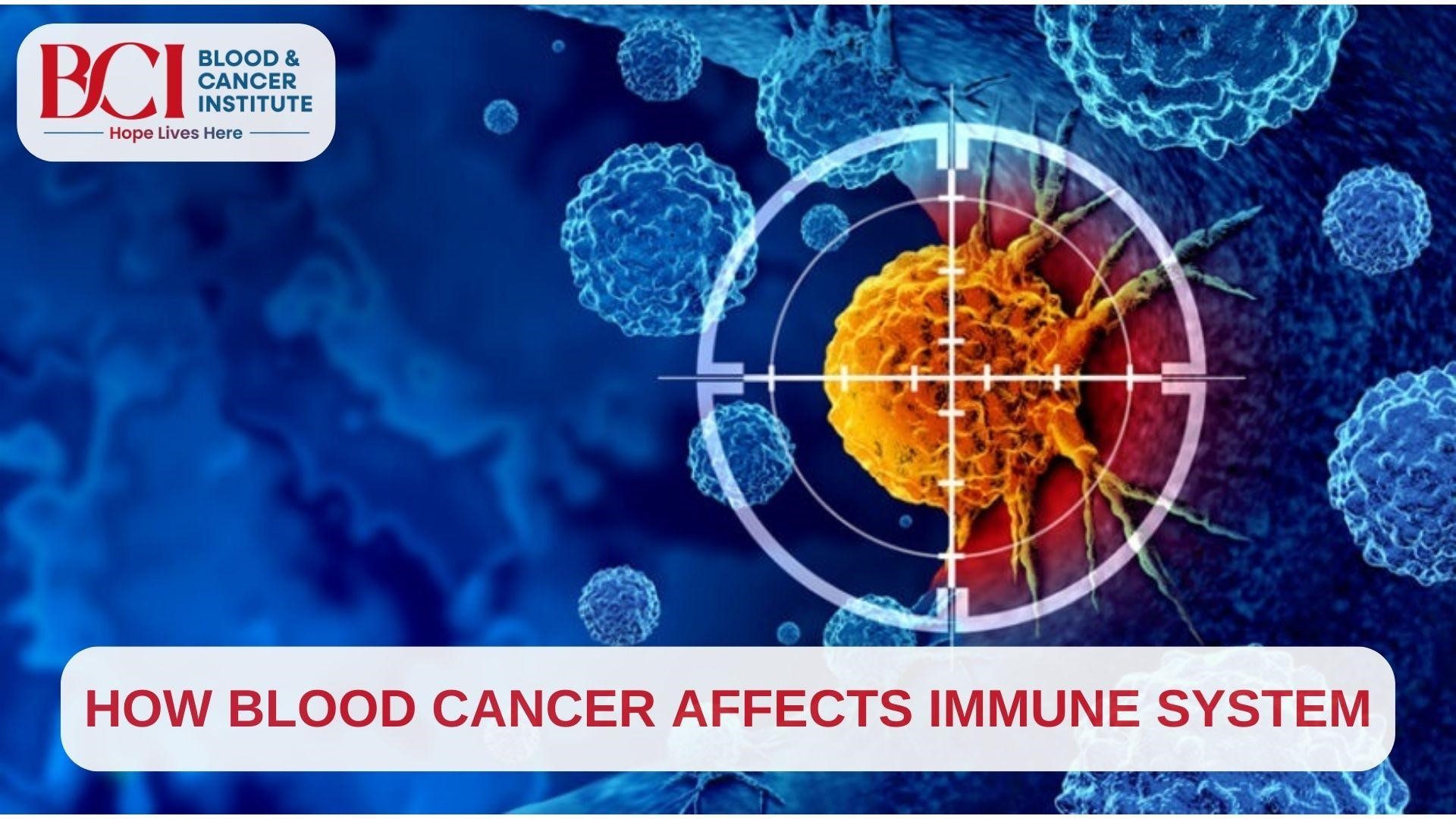
- By : BCI
- Blog
- Comments: 0
How Blood Cancer Affects the Immune System
Blood cancer, also known as hematologic cancer, is a group of diseases that originate in the blood-forming tissues of the body. These cancers can have profound effects on the immune system, compromising its ability to protect the body from infections and other threats. In this blog post, we’ll explore the intricate relationship between blood cancer and the immune system, from our expert blood cancer specialist in Surat at BCI- Blood and Cancer Institute about how these diseases disrupt our body’s natural defenses.
Understanding Blood Cancer
Before delving into the effects on the immune system, it’s crucial to understand what blood cancer is. Blood cancers primarily affect the production and function of blood cells. The three main types of blood cancer are:
- Leukemia: Cancer of the blood and bone marrow
- Lymphoma: Cancer of the lymphatic system
- Myeloma: Cancer of the plasma cells
These cancers interfere with the normal production of blood cells, including white blood cells, red blood cells, and platelets. Each type of blood cancer affects the immune system differently, but all have significant impacts on the body’s ability to fight infections and maintain overall health.
The Immune System: Our Body’s Defense Mechanism
The immune system is a complex network of cells, tissues, and organs that work together to defend the body against harmful pathogens. Hemato oncologists from BCI, one of the best blood cancer hospital in Surat, explain the key components of the immune system:
● White blood cells (leukocytes)
● Lymph nodes and lymphatic vessels
● Bone marrow
● Spleen
● Thymus gland
White blood cells, particularly lymphocytes (T-cells and B-cells), play a crucial role in identifying and destroying foreign invaders like bacteria, viruses, and cancer cells.
How Blood Cancer Compromises the Immune System
According to the cancer specialists in Surat, blood cancers can severely impact the immune system in several ways:
- Disruption of normal blood cell production: Blood cancers often start in the bone marrow, where blood cells are produced. This disruption leads to a decrease in the production of healthy white blood cells, red blood cells, and platelets. With fewer functional white blood cells, the body’s ability to fight infections is significantly reduced.
- Overproduction of abnormal cells: In many blood cancers, the body produces an excess of abnormal blood cells. These cells don’t function properly and can crowd out healthy cells in the bone marrow and bloodstream. This overcrowding further weakens the immune system by reducing the space for healthy, functional immune cells.
- Impaired lymphocyte function: Lymphomas and some leukemias directly affect lymphocytes, key players in the immune response. When these cells become cancerous, they can’t perform their normal functions of recognizing and attacking pathogens or abnormal cells.
- Weakened barrier defenses: Some blood cancers can affect the skin and mucous membranes, which are the body’s first line of defense against pathogens. This can make it easier for harmful microorganisms to enter the body.
- Treatment-related immunosuppression: The treatments used to combat blood cancers, such as chemotherapy and radiation therapy, can further weaken the immune system. These treatments often destroy both cancerous and healthy cells, including those of the immune system.
Specific Effects on Immune Function
Let’s look at how different types of blood cancer affect specific aspects of immune function:
Leukemia
Leukemia affects the production of white blood cells in the bone marrow. In acute leukemias, immature white blood cells (blasts) multiply rapidly, crowding out healthy cells. This leads to:
● Decreased production of normal, functional white blood cells
● Reduced ability to fight bacterial and fungal infections
● Increased risk of severe infections that can be life-threatening
Lymphoma
Lymphomas affect the lymphatic system, a crucial part of the immune system. This can result in:
● Impaired T-cell and B-cell function
● Reduced ability to produce antibodies
● Weakened defense against viruses and other intracellular pathogens
Multiple Myeloma
Multiple myeloma affects plasma cells, which are responsible for producing antibodies. This leads to:
● Decreased production of normal antibodies
● Increased susceptibility to bacterial infections
● Impaired ability to respond to vaccinations
Consequences of a Weakened Immune System
The compromised immune system while undergoing leukemia treatment in Surat can lead to various complications:
- Increased risk of infections: Patients become more susceptible to common and opportunistic infections.
- Prolonged recovery time: Even minor illnesses can take longer to resolve.
- Reactivation of latent infections: Dormant viruses like herpes zoster (shingles) may resurface.
- Increased risk of secondary cancers: The weakened immune system may be less effective at identifying and destroying other cancer cells.
Managing Immune System Challenges in Blood Cancer
Managing the impact of blood cancer on the immune system is a crucial part of blood cancer treatment in Surat. Strategies include:
● Prophylactic antibiotics to prevent infections
● Growth factors to stimulate blood cell production
● Immunoglobulin replacement therapy
● Vaccinations (when appropriate and safe)
● Careful monitoring and prompt treatment of infections
Conclusion
Blood cancer’s impact on the immune system is profound and multifaceted. By disrupting the normal production and function of blood cells, these cancers compromise the body’s ability to defend itself against a wide range of threats. Blood cancer specialists in Surat emphasize on understanding this relationship since it is crucial for developing effective treatments and supportive care strategies for blood cancer patients.
As research in this field progresses, new therapies are emerging that aim not only to combat the cancer itself but also to bolster and restore immune function. These advancements offer hope for improved outcomes and quality of life for those affected by blood cancers.
